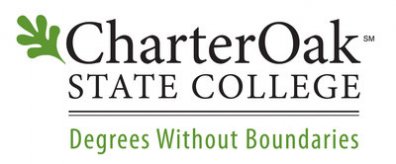Charter Oak State College Among Top 20 Online Bachelors Programs in Student Engagement; Three CT Colleges Reach Top 100 Online
/Student engagement and on-line courses may seem incompatible, but Connecticut's Charter Oak State College is among the best in the nation at bringing those two concepts together effectively. Charter Oak ranked at #90 in the nation in the newly published U.S. News & World Report ranking of the top online bachelors programs in the country, and at #17 in student engagement. In other categories, the online institution, based in New Britain, ranked #187 in faculty credentials and training, and #139 in student services and technology.
Charter Oak State College is Connecticut's public online college offering bachelor's and associate degree completion programs for adults. The college was established in 1973, and offers degree completion programs in a number of high-demand fields including business, health care, public safety, information systems and cyber security. U.S. News indicates that all of the online classes are recorded and archived so students can access lecture material at their own convenience.
The magazine ranked a total of 219 institutions offering online programs, with scores ranging from 100 (Pennsylvania State University-World Campus) to 44 (University of Wisconsin-River Falls). Charter Oak’s score was 69. U.S. News evaluated several factors to rank the best online bachelor’s degree programs, including graduation rates, faculty credentials and support services available remotely. Nearly 85 additional schools were analyzed but did not reach thebachelor's program rankings. 
U.S. News indicates that the new student retention rate in 2014 at Charter Oak was 82 percent, and that 63 percent of students graduate within six years. Total enrollment is 1,898, according to the publication.
In offering the rankings of on-line programs, U.S. News noted that many schools are enriching their online degree programs as student interest in distance education continues to increase.
Among private institutions in Connecticut, the University of Bridgeport ranked at #68 overall, spurred by faculty credentials and training, which ranked at #19. Student engagement ranked at #94, and student services and technology ranked at #132. The most popular online major, according to U.S. News, is dental hygiene and related health professions. UB’s overall score was 74. In addition, UB has the #13 ranked online graduate Information Technology program and #48 best online graduate engineering program.
Sacred Heart University ranked at #87 among on-line bachelors programs. The category breakdowns for Sacred Heart were: #27 in student services and technology, #44 in faculty credentials and training, and #52 in student engagement. Sacred Heart’s overall score was 70. The institution also ranked #70 among best on-line graduate nursing programs.
Enrollment for each of the institutions on-line programs is predominantly female: 64 percent at Charter Oak, 84 percent at University of Bridgeport and 93 percent at Sacred Heart.
U.S. News assessed schools based on four general, weighted, categories:
- Student engagement (40 percent): Quality bachelor's degree programs promote participation in courses, allowing students opportunities to readily interact with their instructors and classmates, as is possible in a campus-based setting. In turn, instructors not only are accessible and responsive, but they also are tasked with helping to create an experience rewarding enough that students stay enrolled and complete their degrees in a reasonable amount of time.
- Faculty credentials and training (20 percent): Strong online programs employ instructors with academic credentials that mirror those of instructors for campus-based programs, and they have the resources to train these instructors on how to teach distance learners.
- Student services and technology (20 percent): Programs that incorporate diverse online learning technologies allow greater flexibility for students to take classes from a distance. Outside of classes, strong support structures provide learning assistance, career guidance and financial aid resources commensurate with quality campus-based programs.
- Peer reputation (20 percent): A survey of high-ranking academic officials helps account for intangible factors affecting program quality that are not captured by statistics. Also, degrees from programs that are well respected by academics may be held in higher regard among employers.
The reliability of the U.S. News rankings continue to be criticized by many in the higher education field for a variety of reasons, ranging from the self-reporting of institutions to the assessment criteria used.
































